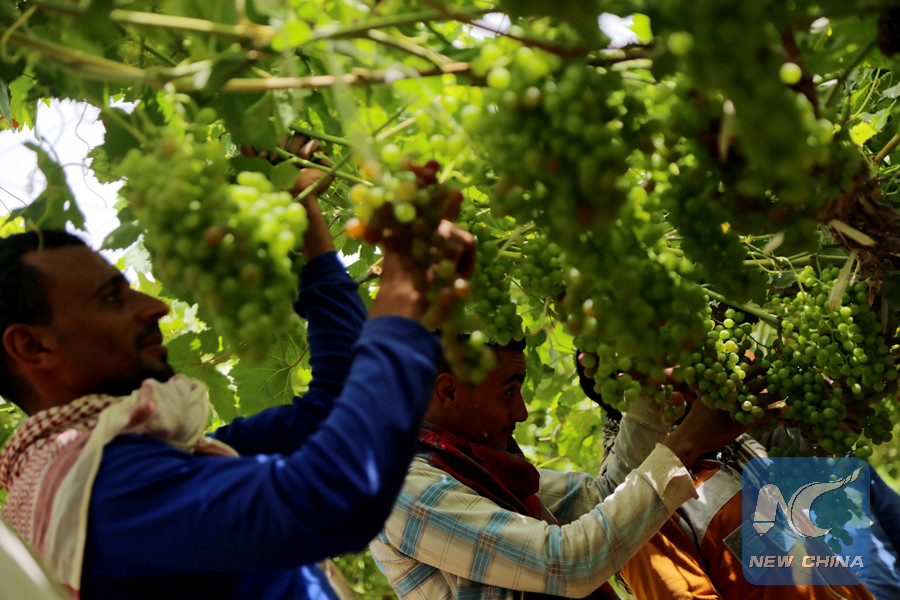
Egyptian farmers work in a grape field in Nubaria, Beheira, Egypt, on May 2, 2018. (Xinhua/Ahmed Gomaa)
BEHEIRA, Egypt, May 4 (Xinhua) -- Sayed Ali, an Egyptian villager in the Delta province of Beheira, gave a radiant smile as he checked his thriving grapes farm on a sunny spring day.
Ali is just one of the 800 farmers and laborers in Nubaria, Beheira, who benefit from a training program organized by the Food and Agriculture Organization of the United Nations (FAO) in Egypt, in cooperation with the Ministry of Agriculture and Land Reclamation, to improve agricultural practices to prevent loss and waste along food value chains while maintaining the quality.
The training is part of the Food Loss and Waste Reduction and Value Chain Development for Food Security in Egypt and Tunisia project, which has been running for almost three years.
The project, which will come to an end in September 2018, is funded by the Italian Agency for Development Cooperation.
Experts deliver the trainings through a mix of theoretical and hands-on field demonstrations.
They also focus on topics covering the entire food value chain, including pre-harvest factors affecting postharvest loss, harvesting, sorting, grading, packaging, storage, food safety, quality control and marketing practices.
"I have learned how to care for my bushes and crops to reduce loss and waste," Ali told Xinhua as he checked dangling green bunches of grapes in his 12.5-hectare farm.
Ali, who is in his late 40s, said the loss and waste used to cost him dozens of U.S. dollars each year. However, it is now almost reduced to zero after he carefully applied the directions of FAO experts.
He said many problems and diseases that used to hit his farm every year have also been effectively avoided.
Ali used to follow primitive growing and fertilizing methods, but since he joined the program this season, the man has learned new and simple care techniques that tangibly helped reduce waste and increase crop volume.
For example, the experts told him which fertilizers to use throughout the season and how to irrigate the bushes to have a better crop.
"I almost have no losses this season, which means I will earn more money," the Egyptian farmer said gladly.
Moreover, Ali said Egyptian farmers like him will learn more ways to preserve their produce through the program.
"We will follow these new methods now and update our knowledge whenever possible. The program is temporary, but the benefit is everlasting," he concluded.
Egypt is among the countries most suffering food waste and loss, especially for perishable products, which have caused serious social, economic and environmental impacts.
This led FAO to launch this project to increase technical and managerial capacity of Egyptian value chain actors, including smallholder farmers, laborers and traders.
The UN organization chose the grapes sector as baseline studies, as the quantitative losses in Egypt are estimated to have exceeded 45 percent.
"Egypt is an excellent producer of grapes. It is one of the biggest producers and exporters in the world, but small-scale farmers are the least able to access information and advice," Jennifer Smolak, Nutrition and Food Systems Officer of FAO Egypt, told Xinhua.
She said FAO has so far trained about 1,200 grapes farmers and laborers by teaching them how to harvest properly and deal with the crops afterward.
"We are also building a processing facility that provides services to farmers," Smolak added.
Egypt is famous for growing several kinds of grapes for both domestic consumption and export. According to official data, Egypt exported 126 tons of grapes in 2017.
Ali hopes he could also start exporting his high-quality grapes, mainly to China which recently signed an agreement to import agricultural products from Egypt.
"China is a promising market for Egyptian products, mainly agricultural ones. I hope I could send my produce to China," Ali told Xinhua.
Egypt became the third largest exporter of citrus to China in 2017, just after South Africa and the United States.

